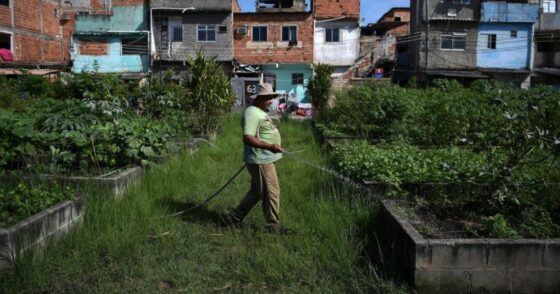
This area was once the drug addict’s playground. It is now the largest organic vegetable garden in Latin America in an urban area. Report from Rio de Janeiro at the heart of an initiative that is both social and ecological.
Not far from a police car, young Brazilians armed with pistols watch an alley in Manguinhos, a favela in northern Rio de Janeiro where gangs of drug traffickers thrive. At first glance, this is not the ideal setting for planting salads. However, it is this street that leads to an organic vegetable garden the size of four football fields, “the largest in Latin America” in urban areas, according to its officials.
A blessing for some 800 poor families who take advantage of cheap vegetables in a country where inflation is pushing food prices to sky-high levels. And above all, no need for chemical fertilizers or other pesticides, the supply of which could be jeopardized by the war in Ukraine, Russia is Brazil’s main supplier.
Monthly 2.5 tons of vegetables
The first seed was planted in 2013 on a vacant lot formerly called “Crackolandia”, where many drug addicts roamed. Carrots, cabbage, cassava and onions grow serenely and the project is appreciated by the population, in this neighborhood where drug traffickers often enforce their law by force.
About 2.5 tons of vegetables are produced every month: half are sold on at the modest price of two reais per kilo (about 40 euro cents) and the other half go to orphanages or municipal retirement homes.
†Why should the poor be doomed to eat poisoned food?”Julio César Barros explains to AFP, one of the vegetable garden managers. “My goal is to make sure that organic isn’t reserved for the elite.” In Rio, most organic products are bought at exorbitant prices by families in upscale neighborhoods such as Ipanema or Copacabana.
A program recognized as one of the best in the world
Manguinhos’ organic vegetables come from the largest of the 56 vegetable gardens of the “Hortas Cariocas” program (vegetable gardens of Rio), set up by the town hall at the initiative of Julio César Barros. This program has been recognized as one of the best in the world by the signatories of the Milan Urban Food Policy Pact, ratified in 2015 by mayors of cities around the world, with the support of the United Nations Food and Agriculture ( FAO).
“This vegetable garden has changed everything for me: my way of life, of food”, says Dione Enedina Da Silva, a 73-year-old great-grandmother who wears a cap to protect herself from the sun while weeding. She is one of the 25 employees of the vegetable garden of Manguinhos, who share half of the sales proceeds.
Before that she worked as a cleaner in hospitals. But most of the other employees were involved “in drug cases”explains Julio Cesar Barros.
“Working here is like therapy. I come every day, even when it rains”says one of these employees, a 40-year-old man who prefers to remain anonymous and discreet about his past activities. “Now my 11 year old daughter eats everything”he says proudly.
school vegetable gardens
In Brazil, the obesity rate for people over 20, which was 12.2% in 2002, has increased to 26.8% in 2019. For Julio César Barros, this is partly due to “deplorable food education” in the largest country in Latin America The “Hortas cariocas” program includes vegetable gardens in schools.
“When a child comes home with a vegetable he has planted at school, he convinces his parents to eat better.”
Julio Cesar Barros
“It’s important to eat healthy food, but it’s not always sold at affordable prices” in the traditional circuits, adds Alesandra Almeira, 39, a native of Manguinhos, who supplies himself weekly in the vegetable garden.
Julio César Barros reveals that the quality of the products is such that he is faced with a “dilemma” when gourmet restaurants want to buy from the program’s city vegetable gardens.
“Hortas Cariocas” is in full expansion: the town hall has announced the construction of a new urban vegetable garden “The largest in the world”with 11 hectares near Madureira Park, a popular area in the north of the city.
(AFP)